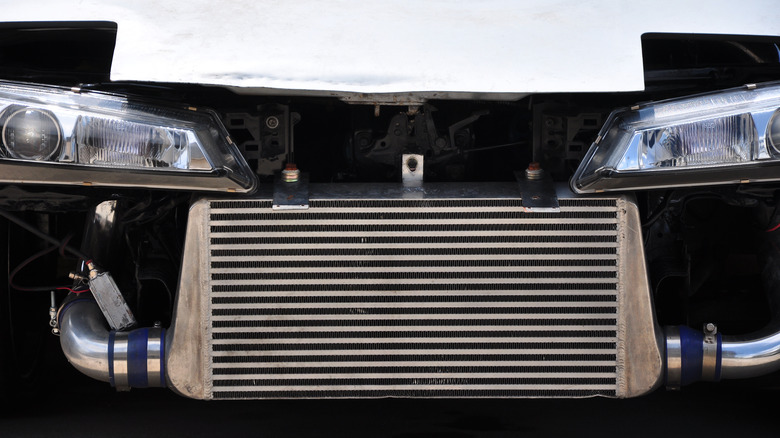What Is An Intercooler And Does It Increase Horsepower?
Smaller engines with fewer cylinders and less displacement could produce more power and torque by turbocharging. A turbo or turbocharger is a forced-induction device that utilizes exhaust gasses to spin a turbine, which feeds compressed air into the engine. It typically sucks air at ambient temperature, compresses the air to around 30% above atmospheric pressure (about 19 psi), and feeds the pressurized, oxygen-rich air into the intake manifold.
You probably heard this too many times, but the adage about internal combustion engines is true: More air means more power. However, the turbocharger needs an ally to mitigate the problem generally associated with compressing air. And that problem is excess heat or heat soak.
Since the turbocharger uses hot exhaust gasses to spin a turbine, the unit is already soaking in heat. Next, compressing air produces heat, and hot air could increase the risk of detonation and power loss. Considering the intake temperatures could reach above 392°F (200°C), the turbocharger needs an intercooler to cool the compressed air.
What is an intercooler?
An intercooler is like a radiator but for air. Whereas your car's radiator prevents engine overheating by lowering the temperature of hot liquid coolant, the intercooler works similarly and lowers the temperature of the compressed air from the turbocharger. Also called a charge cooler or heat exchanger, the intercooler fits between the intake manifold and turbocharger, using a series of piping to take compressed air, dissipate the heat, and feed the cooler to the engine.
Intercoolers could either be an air-to-air or water-to-air unit. An air-to-air intercooler relies on heavy airflow to cool the compressed air. On the other hand, a water-to-air intercooler uses water to absorb heat and has a separate radiator to keep the water cool. A water-to-air intercooler has more parts but is ideal for tighter engine bays, while an air-to-air intercooler uses more piping.
Both types of intercoolers perform the same task. By lowering the intake air temperature, the engine ingests colder, denser air, improving the power and torque output while preventing knocking or detonation. Moreover, denser air enables the ECU to deliver a more precise air/fuel mixture to help improve the fuel economy.
Does an intercooler increase horsepower?
No. Intercoolers are more about efficiency than adding power. Installing an intercooler will make the engine more efficient at producing power, but it won't add noticeable gains in power and torque. For instance, upgrading from a stock to a more significant, aftermarket intercooler won't necessarily increase your engine's power output without some ECU tuning.
The reason is lowering the charge air temperature via a larger, higher-capacity intercooler might add some restrictions to the airflow, which negates the process of cooling the air for better efficiency. In addition, the factory ECU tuning may not respond to the higher volumes of denser air –- like increasing the boost pressure or altering the ignition timing –- without an aftermarket tune.
However, there's a catch, and it's a good one. Upgrading your car's stock intercooler will open the possibility of a more aggressive tune, taking advantage of the vast amounts of denser air. And if you frequent the drag strip or racetrack, a higher-capacity intercooler will better protect the underhood components from heat soak.


